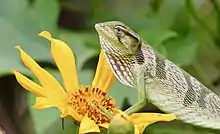Polychrus
Polychrus is the only extant genus of polychrotid lizards in the world.[2] Commonly called bush anoles, they are found in Central and South America, as well as nearby Trinidad and Tobago.
| Polychrus | |
|---|---|
 | |
| Polychrus acutirostris | |
| Scientific classification | |
| Kingdom: | Animalia |
| Phylum: | Chordata |
| Class: | Reptilia |
| Order: | Squamata |
| Suborder: | Iguania |
| Family: | Polychrotidae |
| Genus: | Polychrus Cuvier, 1817[1] |
| Species | |
|
See text | |
Polychrus means "many colored". True anoles in other genera are now placed in Dactyloidae. Polychrus is presently in the family Polychrotidae.[3][2]
Species

Polychrus gutturosus seen in Tapir Valley, Tenorio Volcano National Park, Costa Rica.
- Polychrus acutirostris Spix, 1825 – Brazilian bush anole
- Polychrus auduboni Hallowell, 1845 – Many-colored bush anole
- Polychrus femoralis Werner, 1910 – Werner's bush anole
- Polychrus gutturosus Berthold, 1845 – Berthold's bush anole
- Polychrus jacquelinae Koch, Venegas, Garcia-Bravo, and Böhme, 2011 - Jacquelin's bush anole
- Polychrus liogaster Boulenger, 1908 – Boulenger's bush anole
- Polychrus marmoratus Linnaeus, 1758 – Many-colored Bush Anole, Common monkey lizard
- Polychrus peruvianus Noble, 1924 - Peruvian bush anole
Fossil History
Though species of Polychrus have an almost exclusively South American distribution today, a stem representative, Sauropithecoides charisticus, was reported from the late Eocene of North Dakota, USA.[5][6]
References
- Schlüter 2013: Cuvier 1817, Règne Animal 2: 40. Species typica: Lacerta marmorata Linnaeus.
- "ITIS Report: Polychrus – Cuvier, 1817". Integrated Taxonomic Information System. 7 April 2016. Retrieved 2016-04-07.
- "ITIS search results". Integrated Taxonomic Information System. 7 April 2016. Retrieved 2016-04-07.
- Polychrus, Reptile Database
- Smith, K.T. (2011) The evolution of mid-latitude faunas during the Eocene: Late Eocene lizards of the Medicine Pole Hills reconsidered. Bulletin of the Peabody Museum of Natural History 52: 3-105. https://doi.org/10.3374/014.052.0101
- Smith, K.T. (2006) A diverse new assemblage of late Eocene squamates (Reptilia) from the Chadron Formation, North Dakota, U.S.A. Palaeontologia Electronica 9.2.5A.
| Wikimedia Commons has media related to Polychrus. |
| Wikispecies has information related to Polychrus. |
Further reading
- Berthold, A. A. 1845. "Über verschiedene neue oder seltene Reptilien aus Neu-Granada und Crustaceen aus China". Nachr. Georg-Augustus-Univ. und königl. Ges. Wiss. Göttingen 3: 37-48.
- Boulenger, G. A. 1908. "Descriptions of new South American reptiles". Ann. Mag. Nat. Hist., Ser. 8, 1 (1): 111−115.
- Koch, C., Venegas, P.J., Garcia-Bravo, A. & Böhme, W. 2011. "A new bush anole (Iguanidae: Polychrotinae: Polychrus) from the upper Marañon basin, Peru, with a redescription of Polychrus peruvianus (Noble, 1924) and additional information on P. gutturosus Berthold, 1845". ZooKeys 141: 79−107.
- Linnaeus, C. 1758. "Systema Naturae per Regna tria Naturae, secundum Classes, Ordines, Genera, Species, cum characteribus, differentiis, synonymus, locis. Ed. 10. Tomus I. – Salvius, Stockholm, 824 pp.
- Noble, G. K. 1924. "New lizards from northwestern Peru". Occasional Papers of the Boston Society of Natural History 5: 107−113.
- Schlüter, U. 2013. "Buntleguane - Lebensweise, Pflege, Fortpflanzung". KUS-Verlag, Rheinstetten, 78 pp. (A Monograph on Polychrus)
- Spix, J. B. von 1825. "Animalia nova sive species novae lacertarum,quas in itinere per Brasiliam annis MDCCCXVII-MDCCCXX jussu et auspiciis Maximiliani Josephi I. Bavariae regis". F. S. Hübschmann, München, pp. 1−26.
- Werner, F. 1910. "Über neue oder seltene Reptilien des Naturhistorischen Museums in Hamburg. II. Eidechsen". Mitt. Naturhist. Mus. Hamburg 27 (2): 1−46.
This article is issued from Wikipedia. The text is licensed under Creative Commons - Attribution - Sharealike. Additional terms may apply for the media files.